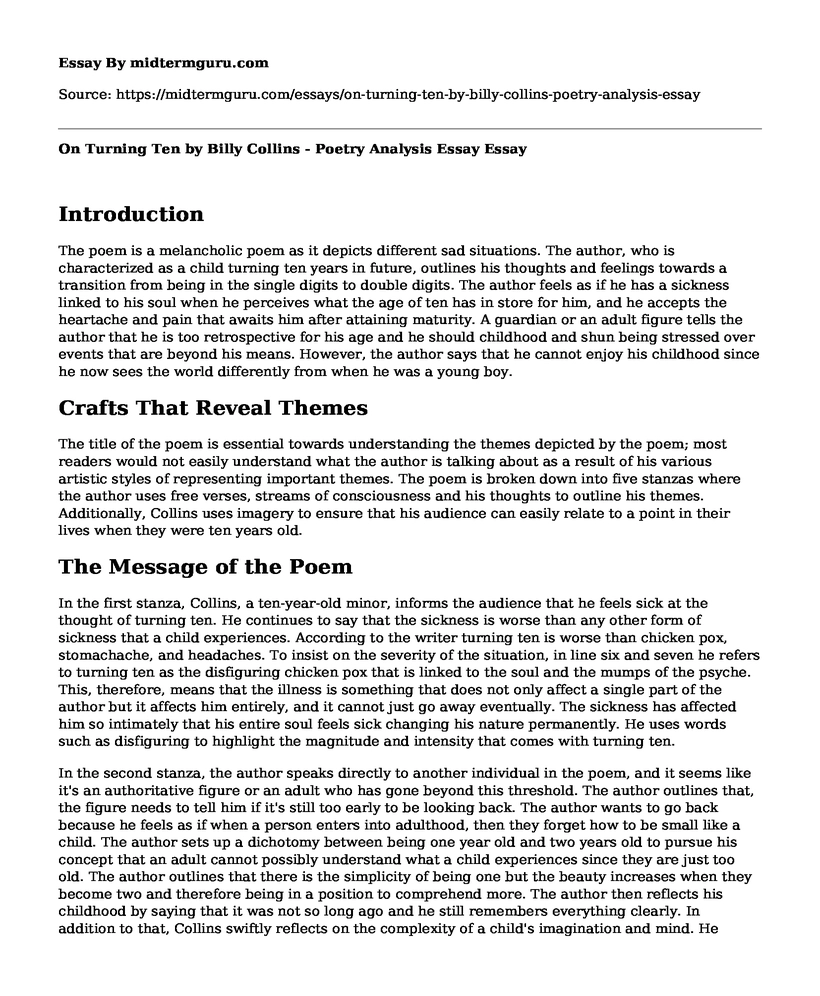Introduction
The poem is a melancholic poem as it depicts different sad situations. The author, who is characterized as a child turning ten years in future, outlines his thoughts and feelings towards a transition from being in the single digits to double digits. The author feels as if he has a sickness linked to his soul when he perceives what the age of ten has in store for him, and he accepts the heartache and pain that awaits him after attaining maturity. A guardian or an adult figure tells the author that he is too retrospective for his age and he should childhood and shun being stressed over events that are beyond his means. However, the author says that he cannot enjoy his childhood since he now sees the world differently from when he was a young boy.
Crafts That Reveal Themes
The title of the poem is essential towards understanding the themes depicted by the poem; most readers would not easily understand what the author is talking about as a result of his various artistic styles of representing important themes. The poem is broken down into five stanzas where the author uses free verses, streams of consciousness and his thoughts to outline his themes. Additionally, Collins uses imagery to ensure that his audience can easily relate to a point in their lives when they were ten years old.
The Message of the Poem
In the first stanza, Collins, a ten-year-old minor, informs the audience that he feels sick at the thought of turning ten. He continues to say that the sickness is worse than any other form of sickness that a child experiences. According to the writer turning ten is worse than chicken pox, stomachache, and headaches. To insist on the severity of the situation, in line six and seven he refers to turning ten as the disfiguring chicken pox that is linked to the soul and the mumps of the psyche. This, therefore, means that the illness is something that does not only affect a single part of the author but it affects him entirely, and it cannot just go away eventually. The sickness has affected him so intimately that his entire soul feels sick changing his nature permanently. He uses words such as disfiguring to highlight the magnitude and intensity that comes with turning ten.
In the second stanza, the author speaks directly to another individual in the poem, and it seems like it's an authoritative figure or an adult who has gone beyond this threshold. The author outlines that, the figure needs to tell him if it's still too early to be looking back. The author wants to go back because he feels as if when a person enters into adulthood, then they forget how to be small like a child. The author sets up a dichotomy between being one year old and two years old to pursue his concept that an adult cannot possibly understand what a child experiences since they are just too old. The author outlines that there is the simplicity of being one but the beauty increases when they become two and therefore being in a position to comprehend more. The author then reflects his childhood by saying that it was not so long ago and he still remembers everything clearly. In addition to that, Collins swiftly reflects on the complexity of a child's imagination and mind. He argues that he cannot remember how he was a soldier, wizard or prince but he vividly remembers taking part in that thing at the age of four, seven and nine years respectively. To further his point, Collins introduces some fantasies just before he turned ten years, creating an end to most of his childhood dreams and ambitions.
Figurative Representation
In the third stanza, Collins portrays a change of ideas by beginning with but. He outlines that he is at the window to take the audience to his present life and how he feels at the thought of turning ten years. The writer seems to dwell only on the negative through his statement of the lighthouse looking so serious and his bicycle leaning against the garage with its speed pizzas spoilt. He is also watching everything from inside the house and not outside the house where he can observe everything. The writer quickly realizes that his innocent days are quickly coming to an end and all that lies ahead is just sadness. He notes that he will have to walk the universe using his sneakers and say goodbye to most of his childhood ambitions and desires.
In the last stanzas, the author juxtaposes his old nature to his new nature. He truly believes that he is extraordinary and different on the inside. He acknowledges that if at any case he was to fall then he would bleed and not shine as he had previously thought. In addition to that, Collins uses a metaphor by comparing life to a sidewalk which is dull and hard and can easily cut an individual when they trip and fall. The author has fallen, injured his knee and is bleeding profusely.
Work Cited
Collins, Billy. "Analysis of On Turning Ten by Billy Collins." Poem Analysis, 13 June 2017, poemanalysis.com/on-turning-ten-billy-collins-poem-analysis/.
Cite this page
On Turning Ten by Billy Collins - Poetry Analysis Essay. (2022, Oct 27). Retrieved from https://midtermguru.com/essays/on-turning-ten-by-billy-collins-poetry-analysis-essay
If you are the original author of this essay and no longer wish to have it published on the midtermguru.com website, please click below to request its removal:
- The Liars Club Memoir by of Mary Karr
- Description of Weapon From the Lord of the Rings - Paper Example
- Literary Analysis Essay on Sonny's Blues
- Critical Essay on Steinbeck's Grapes of Wrath
- Literary Analysis Essay on Twelfth Night by William Shakespeare
- Literary Analysis Essay on Beowulf
- Literary Analysis Essay on 'Theme for English B' by Langston Hughes







